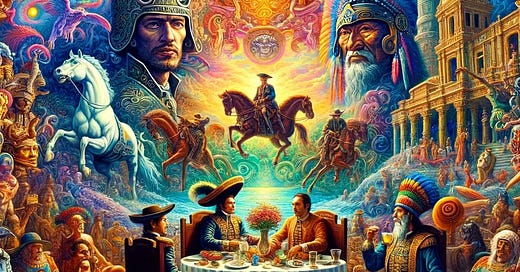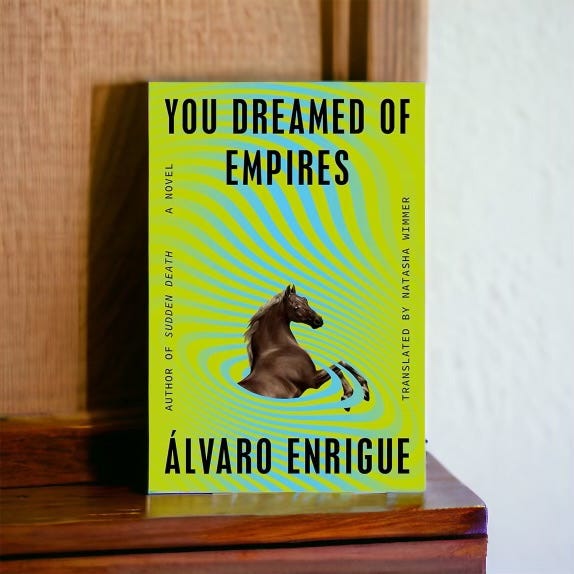By Guest Contributing Writer
Captivating. Witty. Eccentric. Historical. Uninhibited. Ribald. Cultured. Irreverent. All these describe a delectable new novel by an immensely gifted Mexican writer, Álvaro Enrique.
Following the success of his previous novel, “Sudden Death,” which ingeniously revolved around a Renaissance tennis match featuring a ball crafted from Anne Boleyn’s hair, Enrogue’s “You Dreamed of Empires” once again showcases his talent for weaving together history and fiction, humor and seriousness.
The novel unfolds on a single pivotal day in 1519. Earlier that year, the famous explorer and conquistador, Hernan Cortés landed on the Mexican coast, together with a party of Spanish soldiers, over two dozen of his prized horses, and two translators – Aguilar, a friar, and Malinalli, an enslaved princess. Cortés intended to map and explore the area.
Soon after coming ashore, the objective of the expedition changed to the occupation of Mexico. Cortés had no organized plan, however. The party improvised with immense success as they moved toward the Tenoxtitlan (now Mexico City), the capital of the Aztec empire.
During the inland journey, Cortés won many battles and suffered some defeats. Yet, the great conquistador never considered abandoning his quest for domination as more indigenous armies, enemies of the Aztecs, flocked to his side.
In “You Dreamed of Empires,” Moctezuma reigns as the Aztec Emperor. As his alliances are disintegrating and control of his Aztec Empire is threatened, the aging Emperor is constantly slipping into his own sleepy world, fueled by hallucinogenic mushrooms provided by the chief High Priest.
On that eventful November day, Cortés enters Tenoxtitlan seeking a meeting with Moctezuma, which occurs later that day. In the leadup to that fateful meeting, Enrique takes the reader through a litany of events, effectively blending fact with fiction.
The first event is a surreal luncheon where the Spaniards meet Moctezuma’s wife and sister, Atotoxtli. The culture clash between the two sides, connected only through the two interpreters, is highly entertaining. The Aztec high priests in attendance wear capes of human skin with their hair matted by “many moons of sacrificial blood.”
The odors of the food and their luncheon companions are so offensive that one Spaniard is unable to eat. He and Cortés then have a hilarious and cringey argument in Spanish that neither Atotoxtli nor her Aztec companions can understand as both sides continue to smile politely at each other.
Enrique’s use of language (translated into English) brims with irreverence and wit. For example, the author writes that Cortés’s chief infantryman was slow to heed his call to lunch “because he was cutting his toenails – perhaps the only act of hygiene considered vital on campaign….” Enrigue continues, “cutting one’s toenails with a dagger is no easy thing, let alone putting boots back on with bleeding fingers.”
As another example of his wit, the author describes Moctezuma who “ran his tongue over his upper teeth, beneath the down on his lip, like a manatee coming up for air.”
For more humor, Enrigue gives some of the Aztec characters ridiculous names such as “He of the Sun That Falls Like an Eagle So That Jaguars, Moths and Scorpions Live Only a Scarce Few Hours a Day.”
An additional theme is Moctezuma’s obsession with Cortés’s 27 horses which the Emperor calls “deer without antlers” as Moctezuma had never seen a horse. The Emperor covets those horses because even in his stupor, he recognizes their military potential in battles against the Empire’s many enemies.
It could be difficult to keep track of all the book’s characters because their Spanish names appear so similar. Moreover, some characters often are referred to by different names. For example, the Mayor of Tenochtitlan is Tlilpotonqui, who is sometimes referred to as Cihuacoatl. Fortunately, Enrigue has included a useful list of the important characters’ names, ensuring a seamless reading experience.
In the evening, and with great fanfare, Moctezuma and Cortés, and their followers,finally meet. Despite the ease with which Moctezuma welcomed the Spaniards into the city, Captain Jazmín Caldera, who invested in the expedition, starts questioning whether it was all a trap set by Moctezuma.
Were they lured into Tenochtitlan? And were all of the drawbridges to this island city then lifted, so the Spaniards could be captured and slayed?
The climatic evening meeting will determine the future of the Aztec Empire and Spain’s desire for dominance in the Americas. Once more, Enrigue skillfully mixes history with fantasy to weave a wonderful and unexpected tale about the pivotal confrontation between these two monumental leaders.
Despite the seriousness of the encounter, the author once again displays his sense of humor by describing how during the meeting, Moctezuma’s priest magically creates music – T. Rex’s “Monolith.” The Aztec ruler, fueled by “magic” mushrooms, gently swings his hips, pulling his elbows tight and shimmying to the crooning of Marc Bolan, the leader of the 1970’s glam rock band.
The meeting between Moctezuma and Cortés is riveting. I will leave it to the readers to discover the meeting’s outcome for themselves.
Though “I Dreamed of Empires” abounds with wit and humor, it is a serious work. We see vast cultural differences. There are serious miscommunications as the two sides never speak directly but through the two translators.
We observe the longings of the conquistadors to conquer and subjugate the indigenous people of Mexico. Women, including Moctezuma’s wife and sister Atotoxli, are treated not just as second-class citizens but as chattels that can be easily discarded, including being put to death at the Emperor’s whim.
“I Dreamed of Empires” is more than a rollicking romp through history; it is a poignant exploration of cultural collision, power dynamics and the folly of conquest. This book solidifies the author’s reputation as a master storyteller. I eagerly await Enrigue’s next work.
Join Us Today and Support Independent Writing
As a supporting member of "Great Books, Great Minds," you'll dive deeper into a world where your book passions thrive. For just $6 a month or $60 a year, you unlock exclusive access to a close-knit community eager to explore groundbreaking reads.
You won't just take in a book; you'll engage in meaningful conversations, connect on a more profound level with fellow book lovers, and enjoy VIP discussions with bestselling authors.
Plus, you'll receive handpicked book recommendations tailored for you. This is your chance to be at the heart of a community where literature bridges souls and authors share their secrets, all thanks to your support.
In the spirit of community, connection, and conversation, please join us today. Always stay thirsty for a great book
Diamond-Michael
Independent Journalist and Global Book Ambassador









Very interesting review. I think that is a fascinating moment in history and crucial for that region. It’s not a common subjects of fiction books which makes it unique.